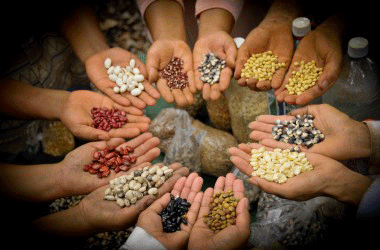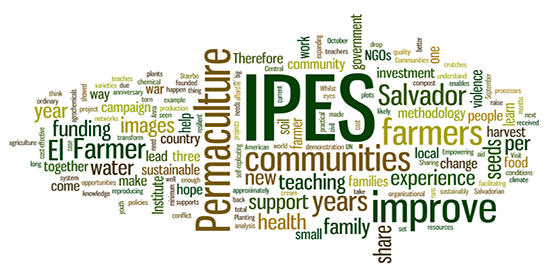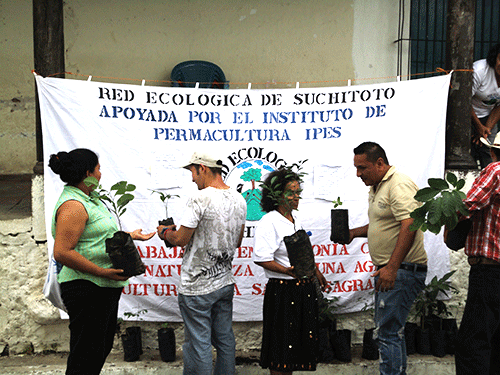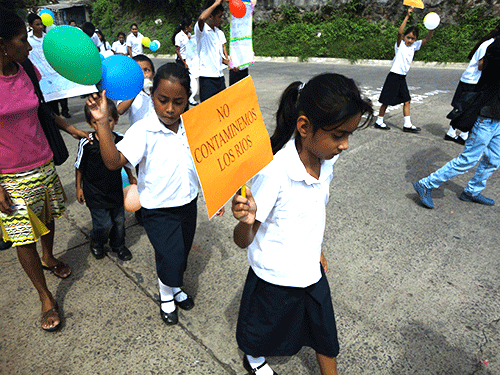Guest post by Anna Stærbo
When you think of the small Central American country El Salvador, what is the first thing that come to mind? For most people it is images of the massacres, disappearances and violence it suffered during the civil war of 1980s – and most recently gang violence that has made El Salvador one of the most dangerous counties is the world. The Permaculture Institute of El Salvador (IPES) is trying to change that by planting new images – images of hope and the real alternatives we have been building the past 10 years since the Permaculture Institute was founded.
Sharing the wisdom – farmer to farmer
What separates IPES from other NGOs is the way they combine teaching Permaculture with the methodology “Farmer to Farmer”. Through this method farmers learn how to work together to improve the environment, produce more food and improve their water and health sustainably. As they reap the benefits, they share their own experiences. IPES teachers are all subsistence farmers with many years of practical experience, which can be seen on their demonstration plots – and it is this which convinces other farmers to embrace change, developing confidence and self-reliance in the communities.
We take a holistic approach
 To improve the maize harvest, IPES teaches the community about soil ecology and how to build fertility, understand the water cycle and improve soil humidity, choose pest- and climate-resistant varieties and create a resilient and diverse ecosystem. Community health is integrated with sustainable agriculture as communities learn to improve water quality and sanitation as well as the inhabitant’s diet.
To improve the maize harvest, IPES teaches the community about soil ecology and how to build fertility, understand the water cycle and improve soil humidity, choose pest- and climate-resistant varieties and create a resilient and diverse ecosystem. Community health is integrated with sustainable agriculture as communities learn to improve water quality and sanitation as well as the inhabitant’s diet.
Empowering communities to work together
IPES’ experience is that communities, who support each other, are most likely to improve their conditions. Therefore IPES supports the community associations, women and youth committees, teaching meeting and organisational skills, facilitating processes of needs analysis, strategic planning and conflict resolution. Communities are encouraged to form local networks to share experience and resources and to have a stronger voice in influencing local development policies.
Permaculture is cost-effective
Permaculture enables farmers to experiment and share knowledge and seeds in an ever expanding, self-replicating system of mutual aid, which requires minimum ongoing outside investment. A case study of IPES’ projects showed that a total project investment of £260 per family per year over three years lead to an improvement in family income of approximately £600 per year thereafter. It also lead to improved long term food production and sustainable health improvements. By saving on agrochemicals and improving their harvest, after three years initial support, families were better able to support themselves. The success of the “Farmer to Farmer” methodology led to a 93% drop in IPES´ expenditure on seeds and plants for communities – due to farmers reproducing what they received and sharing them with new families.
Keep the ball rolling
This September marks IPES’ 10th anniversary and at last the eyes of the Salvadorian government, UN agencies and NGOs are finally fixed on what they’re doing. There’s just one temporary setback. Whilst IPES is pretty sure government funding will come their way next year, their current funding runs out this October and they can’t afford to cut back any further – even for a few months. Therefore they’ve set up a crowdfunding campaign at Indiegogo to raise enough funds for IPES to continue until new funding opportunities manifest. They need your help to make this happen.
If you believe in the power of Permaculture, please help IPES transform their war torn, climate stricken country into an example of what ordinary people can do for themselves. For the small cost of a big ice cream this summer, you can fund teaching a family how to make their own compost and lose their chemical crutches.
Visit IPES’ campaign at www.indiegogo.com/viva-permacultura



